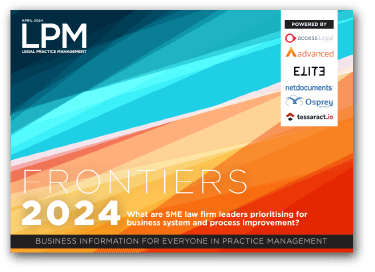Contents
Why you need to align your success measures to your law firm’s values
What sets you apart from your competitors? What are the core values of your team that help you deliver a service that is unlike any other firm?
62% of SME law firms surveyed in the LPM Frontiers report, believe firms entering their geography pose the biggest risk, and 63% believe it’s bigger firms, but ultimately, the legal sector is a highly competitive market meaning both talent and clients have plenty of options.
Define and focus your values
This is why 57% of SMEs are investing heavily in improving the client experience and why 56% have found attracting and retaining talent more challenging in the past 12 months. The pressures of the competition – no matter their size or location – are impacting the future success of firms. With so many options for your clients and employees, there needs to be a clear value proposition to encourage them to choose your firm to work with, and to work in.
In a recent interview with Simon McCrum, for the Empower Law Firm Leaders series, he emphasised the importance of having a strong team pulling in the same direction to run a successful modern law firm; “Having loads of people, in their own boats, rowing in different directions doesn’t get anyone far. The power – when all your brilliant people are in the same boat, rowing hard in the same direction – is unstoppable. There’s a transition period you have to go through to get everyone in the same boat, that period is hard, and a lot of firms simply don’t get there.”
So, how do your values and goals align and benefit the team you want to grow and the clients you wish to win? And crucially, how are you measuring the success of your values against the long-term performance of your business?
The connection between values and long-term performance
Defining your business values and firm-wide goals helps to align teams and outlines the reason why the business exists. When the end goal and value set is clearly communicated, it helps to shape the behaviours and mindsets of your employees. When they align, this is a powerful force to make change and succeed.
Clearly defined expectations promotes autonomy and holds people accountability for their contribution to the firm. This then empowers teams to innovate, improve and make changes to ensure internal alignment.
And, when teams are continually striving for the same goal it has an inevitable impact on overall performance. Employee satisfaction improves, the client experience is prioritised, efficiencies increase – helping you to meet your goals and sustain long-term performance.
Measuring ROI on legal tech
47% of leaders believe they cannot realistically assess the return on investment of new technology – an alarming figure when 63% of firms state their legal tech spend will increase in 2024 – 2025. To ensure technology is assisting with the top two challenges facing SMEs – retention of clients and employees – it’s important to ensure your ROI measures are aligned with your version of success.
Measuring cost benefits is crucial. When 37% of SMEs see cost management as their top challenge this year, against an increased number of firm closures, ensuring a profitable operation is paramount. But, when assessing ROI on tech there are other business areas, values and goals it will directly impact – outside of efficiency – that will help to represent the total value the investment delivers. How does your tech investments enhance the client experience, reduce errors, evidence compliance, and impact employees?
Legal technology impacts compliance, the client experience, and employee satisfaction
81% said risk management was a key driver for cloud adoption, followed by 60% stating a more productive work experience is their driver. This is likely, or at least should be, some of the key drivers for adopting any new tech or becoming a digital-first firm (as 56% are prioritising for the next 12 months). And so, aligning success measures to track, monitor, and review the return of tech investments should also consider the impact on other areas of the business including:
- Mitigating risk and ensuring compliance
- Improving employee satisfaction and team collaboration
- Enhancing the client experience
- Increasing efficiencies and team productivity
- Identifying opportunities for growth and improvement
- Managing cashflow and profitability
Legal tech can provide a future-proofed foundation and effective tools for delivering on your values and the promises you make to clients and employees. It enables your team to perform their best and deliver a quality service that helps your firm retain a competitive edge and charge more per case.
Download the report below

Download the LPM Frontiers 2024 Report for SME law firms
The annual snapshot of law firms’ changing strategic priorities.



